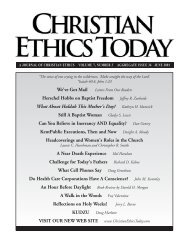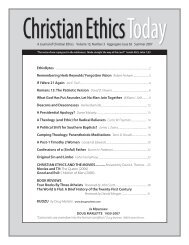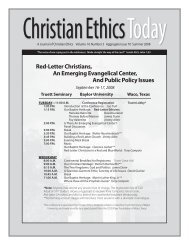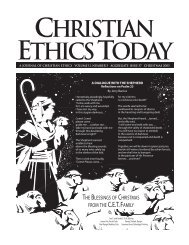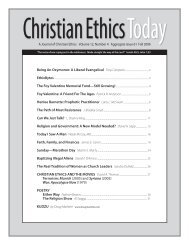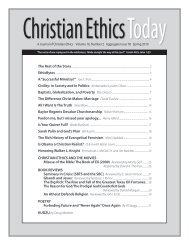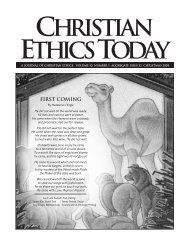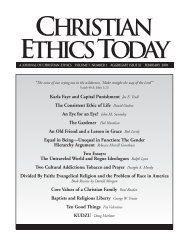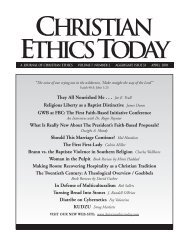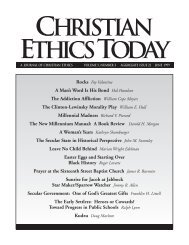Issue 048 PDF Version - Christian Ethics Today
Issue 048 PDF Version - Christian Ethics Today
Issue 048 PDF Version - Christian Ethics Today
You also want an ePaper? Increase the reach of your titles
YUMPU automatically turns print PDFs into web optimized ePapers that Google loves.
ly written essays from both women and men, all of whom<br />
possess exceptional qualifications to write about the subject.<br />
Granted there will be some wide divergences today on this<br />
subject, but it will not go away despite one-sided votes in<br />
denominational actions. Here is a book that eloquently testifies<br />
to the rationality of continued and balanced debate.<br />
To the reviewers, some of the highlights included Fisher<br />
Humphrey’s essay on “Women in <strong>Christian</strong> Ministry.” It is<br />
replete with an effective view of Scripture and logic that is<br />
both convincing and helpful. William Hull’s overview of<br />
“Women and the SBC,” likewise frames this entire issue in<br />
such a way that its importance and seriousness comes<br />
through sensibly with some strong guidelines of permanent<br />
value.<br />
The reader will take away some permanent memories<br />
from this primer. Gladys Lewis and her pilgrimage in<br />
Colorado and Oklahoma, Julie Pennington-Russell and her<br />
pastoral challenges, and biblical insights from Ruth Ann<br />
Foster, Catherine Clark Kroeger, Sheri Adams, Karen<br />
Murray, all collectively bring some urgently needed insights<br />
to the table. They need to be heard. These are not radical<br />
feminists, but genuine, balanced, experienced women whose<br />
opinions will help individuals who are searching for guidance<br />
in this troubled field of thought.<br />
The Trulls’ contribution to this book is timely and helpful.<br />
They bring not only editorial skills, but both are also to<br />
be commended for their research and writing. What a price<br />
they paid for daring to write positively about women in ministry.<br />
Peculiarly pressured into early retirement, their experiences<br />
testify to the absolute necessity of strong biblical<br />
thinking and application in this area.<br />
One inevitably concludes, not just from the Trulls’ book<br />
nor alone from the Bible, that God goes on calling women<br />
into ministry. In spite of all this confusion, remarkable<br />
things are happening to and for women in <strong>Christian</strong> service,<br />
business administration, political advancement, and personal<br />
fulfillment.<br />
Personally, the reviewers wish the publishers had come up<br />
with a better title and a more attractive book cover. One of<br />
the sub-titles, “The Baptist Debate Over Female Equality” is<br />
more to the point, even though perhaps inadequate. Don’t<br />
let these minor flaws, however, deter you from looking seriously<br />
at this meaty material that abundantly aids in this ongoing<br />
debate. ■<br />
28 • FEBRUARY 2004 • CHRISTIAN ETHICS TODAY<br />
“Whatsoever things are lovely . . . think on these things”<br />
Philippians 4:8<br />
Fire: The Joy of Stoking<br />
and Poking<br />
By Foy Valentine, Founding Editor<br />
Winter’s grip has been firm again this year. It usually is. I<br />
deal with it grudgingly and sometimes grouchily. One of<br />
my best but not very clever or innovative ways of dealing with<br />
it is by building a good fire in my big wood-burning fireplace<br />
in my blessed study.<br />
Just today I have been contemplating my blessings while<br />
sitting in front of this fire which I have kept stoked and poked<br />
since very early morning. Some of these blessings have not<br />
exactly overwhelmed me but have instead slipped up on me,<br />
sidling in, dropping down, and even creeping up from behind.<br />
Some may be worth sharing.<br />
1. The fire itself. Since time immemorial fire has been one of<br />
our most treasured human possessions, one of life’s most<br />
basic necessities, about as rudimentary as food, clothing,<br />
and shelter. Our ancestors, of course, did not invent fire.<br />
After lightening would strike a tall tree or after a volcano<br />
would erupt with a fearsome flow of red hot molten lava, I<br />
suppose our forebears readily enough found that they were<br />
significantly more comfortable with the fires that had been<br />
started than they were without them. Then I suppose they<br />
began to tend the fire, to nurture it, and to guard it. When<br />
the weather was cold neighbors would share a few live<br />
coals with which their friends could rekindle their own<br />
fires that had inadvertently been allowed to go out. Early<br />
on, ingenious persons around the world devised ways and<br />
means of starting fires, using sticks rubbed together, flint<br />
rocks, or twirled points in a bed of dry moss. Matches<br />
were not invented until very recent times. The<br />
Encyclopedia Britannica says that the first practicable friction<br />
match was marketed in 1827. That is when my great<br />
grandfathers and grandmothers were already grown young<br />
men and women. My particular fire before which I am<br />
now sitting was started with an ingenious little propane<br />
torch costing about $3 which, when triggered lights a natural<br />
gas starter which in turn quickly catches my wood on<br />
fire. Presto. I have fire in my fireplace.<br />
Hearth and home have long gone together. In the old<br />
days home without a hearth would hardly have been imaginable.<br />
When I was growing up 75 years ago, my mother,<br />
on a bitterly cold winter day when it was simply too cold<br />
to fire up the kitchen stove on the north side of our drafty<br />
two storied house, would prepare a big black iron pot of<br />
hominy which she would cook for a very long time over a



